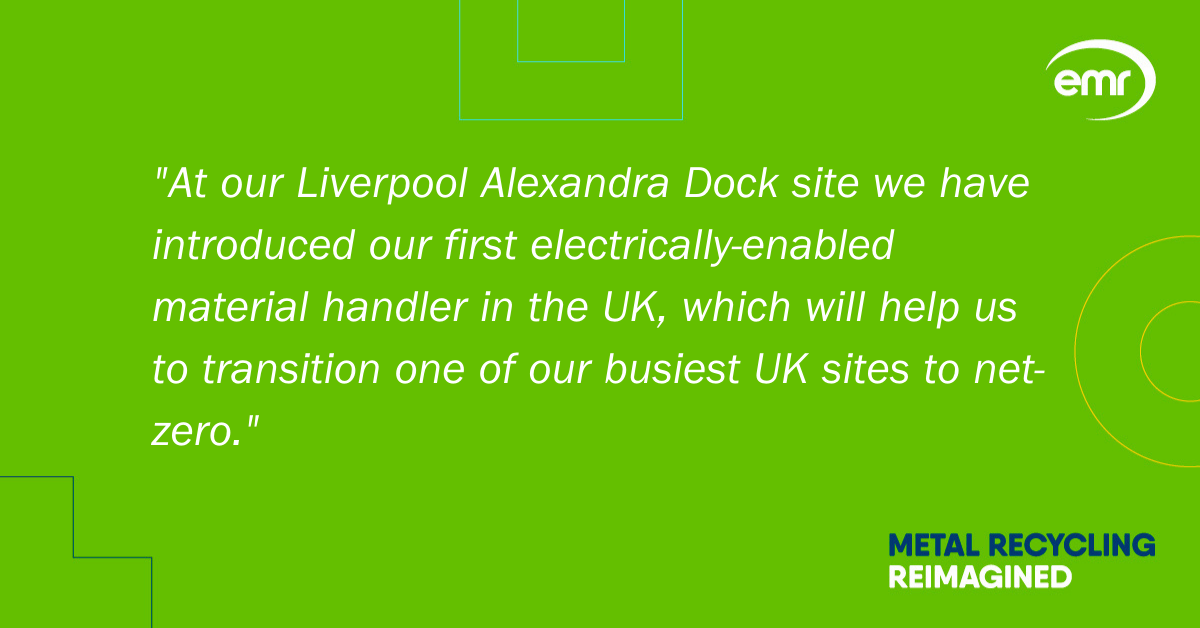CHOOSE
A DIFFERENT TERRITORY
As EMR transitions to become a net-zero business by 2040, one of the significant challenges lies in cutting emissions on our sites themselves.

Our business is a side of the waste industry that most people never see. Rather than handle low-value household waste that requires a service fee to process, EMR doesn’t charge most of its customers a collection fee because the commodity value of the waste we manage pays for the processing and handling we do.
So, while our sites are very similar to those handling other forms of waste in that you’ll tend to see materials separated into piles, those piles of material tend to be different grades of metals. Our job is to sort, segregate, clean and grade the material that we receive to turn it into a high quality raw material package that a steelworks or manufacturer can accept and make back into new products.
All of this takes energy-intensive equipment, from material handlers that move the material onsite, to the huge hydraulic forces needed to cut and densify metals via shearing, bailing or shredding machines. As EMR processes everything from fridges to cars, trains to aircraft carriers, these processes understandably account for a large percentage of our carbon emissions.
This is changing.
Firstly, EMR is currently investing in a new generation of electric-powered technology to replace our diesel-based machines. At our Liverpool Alexandra Docks site we have introduced our first electrically-enabled material handler in the UK, which will help us transition one of our busiest UK sites to net-zero. This machine is currently powered by a diesel generator system.
Over the next few years we will be able to install a fixed cable to this crane, which will allow us to switch to a renewable power supply. At our Willesden site, meanwhile, one of EMR’s largest capacity shredders was recently given an upgraded electricity-based power system, which will reduce significantly the amount of electricity we consume per tonne of steel recycled.
As EMR invests in its future, more opportunities to cut emissions on our sites will emerge.
Each one of our on-site employees has an important role to play. By asking them to look at how much electricity and fuel is consumed per tonne of material the company produces, we have encouraged our material handler operators to consider whether each transfer of material around the site is really essential. Do they need to leave machines idling between uses or can they turn them off? Even switching a light off when staff leave an office can make a real difference when repeated across all of our sites.
As we develop net-zero recycling solutions, we will focus on creating cleaner materials with fewer impurities. Not only will this mean EMR is producing high-quality steel from recycled products, but it also makes our operations more efficient. If we can improve the yield of steel for our customer by 10 percent, that means the steel mill will need to use 10 percent less energy to produce it.
We are also investing in IT, working out how to harness the power of artificial intelligence and machine learning to find further efficiencies in our on-site operations. This might be in the grading of scrap or it may be used to look for impurities or to find new ways to reduce energy consumption.
Here, EMR is able to benefit from advances happening across many different industries. An example of this is the application of AI in finding tumours on X-rays which is similar to the challenge of finding and sorting metals on a conveyor belt. As we develop machine learning around our processes, they will get better at what they do – increasing efficiency and helping us drive down our carbon impact.
We’re already in the process of starting trials using this technology and, as time goes on, further such opportunities are certain to emerge.
So, when it comes to reducing our on-site carbon emissions to zero, EMR is working on a number of fronts: we’re updating our technology, harnessing the power of our employees and ensuring that we’re a step ahead when it comes to delivering new, more efficient products and processes.
It’s a complex task but EMR is getting it done.
Read about our sustainability commitments and our plan to be net-zero by 2040.